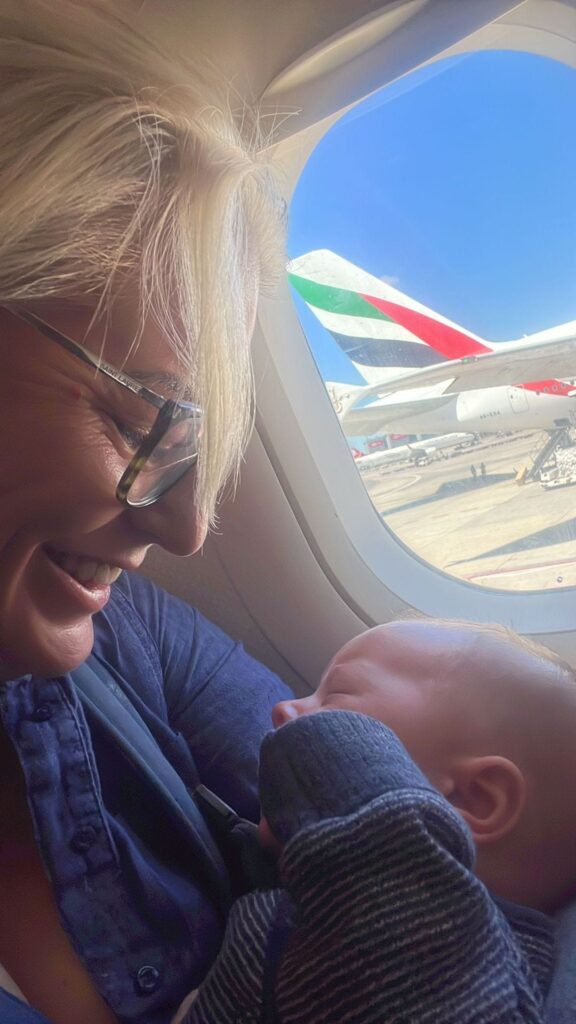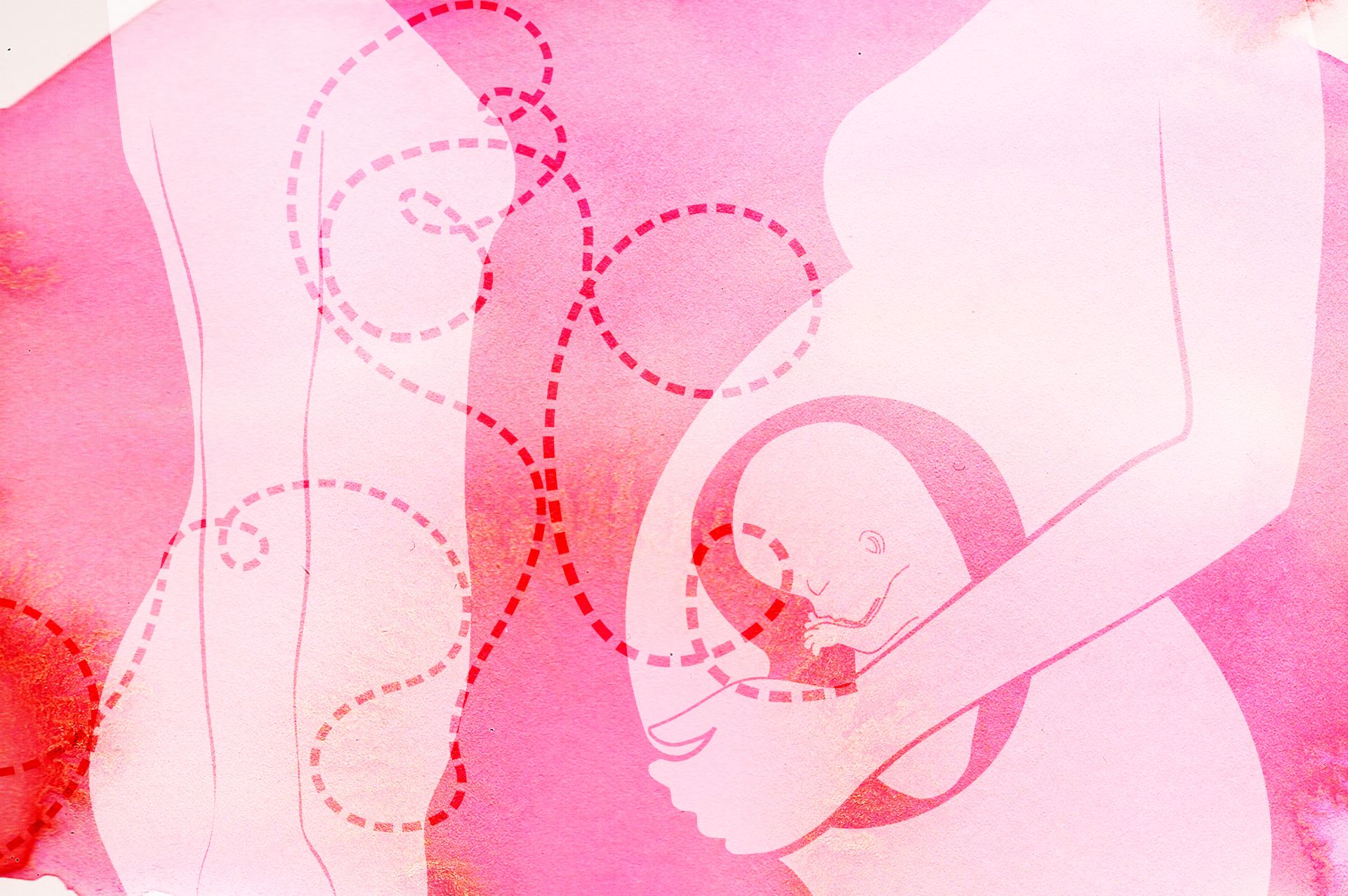“His name is Jacob Earling,” says Jenny Berg, her eyes glistening as she gazes down at the tiny baby curled up in her silk top. Berg, a 43-year-old from Gothenburg, Sweden, and her newborn son are resting in a hammock in the manicured garden of a hotel in the Georgian capital of Tbilisi.
“Earling was what I called him when he was an embryo. But it wasn’t a very international name so I changed it to Jacob Earling.” The switch seems fitting: Jacob Earling is a global baby. At just 6 weeks old, he is already well traveled, starting from conception. He was created in Spain by in vitro fertilization (IVF) using Berg’s egg and her husband’s sperm; as an embryo, he was frozen for three years before a brief hiatus in Athens and then transported via biological courier to Tbilisi, where he spent nine months growing inside the womb of a Georgian woman named Diana, at a cost of tens of thousands of dollars to his Swedish parents.
Jacob Earling, who has two first names, is one of a growing number of babies born via commercial surrogacy, when a woman carries and gives birth to a child for someone else, in exchange for money. The industry is booming around the world as the desire for children grows on the back of increased infertility and changes in social attitudes toward same-sex couples. Celebrities who have hired surrogates, from Elton John to Priyanka Chopra, have helped its meteoric growth, leading Delaware-based Global Market Insights to predict that by 2032, the business will have grown tenfold, to some $129 billion — the same worth of the international chocolate business — from a decade prior.
But outsourcing pregnancies and childbirth raises serious ethical questions about paying women who are in need of cash for the use of their bodies, and feminists are often divided on the issue. Some view the practice as a means of gaining financial autonomy, while its critics blame the industry for taking advantage of the vulnerable and exploiting the poor. Surrogacy laws vary hugely across the globe, but for-profit surrogacy is only allowed in a few places, including at least 10 U.S. states, Russia and Colombia. So-called altruistic surrogacy — meaning no money can change hands apart from associated expenses — is tolerated in more countries, including the U.K., Brazil and Australia. Perhaps unsurprisingly, surrogates in nonprofit arrangements are often relatives, with a vested emotional and genetic interest, according to leading American surrogacy agencies. In January, Pope Francis weighed in on the divisive issue, calling for a global ban on all forms of surrogacy, a practice that violates “the dignity of the woman and the child.”
Russia’s full-scale invasion of Ukraine two years ago highlighted the precarities of the business, when expectant mothers were suddenly forced to relocate within the country and foreign couples jostled with the prospect of entering a war zone to attend the birth of their child. The war quickly booted Ukraine from its place as the world’s second-largest surrogacy market after the United States. Georgia and Cyprus have since absorbed most of Ukraine’s share.
Intended parents from across Europe, as well as the U.S., Australia, Canada, China and a growing number from Arab countries flock to the small nation of Georgia in the South Caucasus to hire a local woman to gestate their child.
Yet now the future of this lucrative industry hangs in the balance. In June 2023, a draft law was introduced to ban commercial surrogacy in Georgia and to allow the practice only on altruistic grounds, meaning no money can change hands. Crucially, no foreigners will be allowed to rent the wombs of Georgian women; hiring a surrogate will be legal only for Georgian nationals, who make up less than 5% of current prospective parents. Former Prime Minister Irakli Garibashvili said this would protect surrogate mothers from exploitation and prevent child trafficking, amid concern in government about the difficulty tracking where surrogate babies end up.
Even if the ban comes into force, the swelling demand across the globe means it will simply move elsewhere: Clinics in Albania are already looking into how to capitalize on the potential hole in the market. Just as panicked couples were once moving their embryos from war-stricken Kyiv to Tbilisi, family lawyers say they are now shipping embryos from Georgia to Albania, hoping to find a surrogate there instead.

While there are no records kept on exactly how many babies are born via surrogacy in Georgia each year, the country’s Ministry of Health estimates its number has doubled in the five years leading up to 2022, when it reached about 2,000. Surrogates in Tbilisi are overwhelmingly from poorer backgrounds. Their ages vary — from roughly 20 to 38 — but a sizable majority are single mothers, according to Tatiana Panteleeva, the patient coordinator at Tbilisi’s Chachava Clinic, which enlists gestational carriers from across the country and sourced Berg’s surrogate, Diana.
Founded a decade ago, the IVF and surrogacy center has a lavish feel and resembles a hotel lobby, with marble floors, large plant pots and gold leather sofas. After the babies are born, the clinic places the parents in a modern complex on the city’s outskirts while they wait for the paperwork to return home with their newborns.
Being a single parent, Diana is entitled to government benefits, but Berg is mindful of how painfully low these are in Georgia compared with Sweden. She takes some comfort knowing that the surrogacy provided Diana with a wage while looking after her own child:
“Here [in Georgia], it’s an option to survive as a mother of a young child,” Berg tells New Lines. “You can’t work but you can be pregnant.”
In the Chachava Clinic, I met a single mother called Mariam, who gave only her first name. She was several weeks away from the embryo transfer that she hoped would lead to her second surrogate pregnancy. She first decided to become a surrogate in 2020 for an Israeli couple after a friend, and former surrogate, recommended it to her because of the financial compensation. We sat in a quiet corner on the ground floor, away from the bustle of the IVF clinic upstairs. Mariam is petite, stylishly dressed and very composed.
“Surrogacy is hard. It’s a big pressure and responsibility to carry someone else’s child,” she tells me. Her voice is soft, but she speaks directly. “But in Georgia, there aren’t enough jobs to move forward and do all the things I need to do for my son.” Mariam is already considering becoming a surrogate for a third time. “It depends how easy this next birth is.”
In Georgia, having a child via surrogacy typically costs intended parents from $50,000 to $70,000, including IVF treatment. Once the clinics, agencies and doctors have taken their cut, the surrogates receive from $17,000 to $22,000 — a hefty sum for less than a year’s work in a country where a restaurant server earns an average annual salary of about $4,500. A surrogate’s fee is generally paid in installments, meaning if they miscarry, they still get some compensation. The largest sum of money comes after the baby is born.
Qualifying to become a surrogate is competitive. Roughly one fifth of women in Georgia who apply make it through the strict vetting process, explains Maka Mebagishvili, a patient coordinator at Beta Plus Fertility Center, a modern clinic on the outskirts of Tbilisi providing IVF and surrogacy services. Potential surrogates must undergo stringent medical and psychological assessments. Most importantly, they are required to have at least one child of their own, to both prove they are capable of physically carrying a child and mentally able to accept the challenges of a pregnancy. Experts say this is also designed to help prevent the surrogate from becoming too attached to the baby growing inside them.
No surrogacy journey is exactly the same. Sometimes, intended parents worry about Tbilisi’s high levels of pollution and ask for a surrogate from a rural part of the country who will spend most of her pregnancy in fresher air, says Panteleeva. Some couples ask for a younger surrogate on the basis that their bodies are better equipped for childbirth, she adds, while others, including Berg, prefer someone older, prioritizing emotional maturity.
Some intended parents undergo IVF in their home countries and ship the embryo to Georgia; others may seek an egg or sperm donor in Georgia in addition to a surrogate. As in the United States, carriers in Georgia are forbidden from using their own egg, meaning they will have no genetic link to the child. All couples pursuing surrogacy at Chachava Clinic have either a history of pregnancy loss or genetic diseases that prevent successful birth. Berg and her husband spent the last eight years trying for a child, including 16 grueling rounds of IVF. Two painful miscarriages led doctors to tell her she would never have a child. “But I never thought of giving up,” says Berg.
A couple of frantic months of online research of fertility clinics around the world led Berg to a well-respected clinic in Spain. There, she underwent six rounds of IVF and managed to create two healthy embryos early on. Berg gave them names, “Alma” and “Earling.” Both were frozen in Spain while she completed the lengthy IVF treatment, but she “talked to them every day, telling them I loved them.”
In Spain, the doctors managed to identify a biological problem: Berg had a KIR AA immune system — an extremely strong immune system, rarely found outside of East Asia. “I bet you never get sick,” she recalls the doctor telling her. And he was right: “I’ve had about two days off work sick in my whole life,” she says. But, while the ability to evade the flu might sound enviable to most, this overpowering immune system was causing her body to reject embryos.
For her pregnancy with Alma, the doctors in Spain suppressed her immune system to a potentially dangerous level, warning her that catching COVID-19 could kill her. She was under strict instructions not to leave her hotel room or meet anyone. Yet even this drastic intervention wasn’t enough. She miscarried six weeks after implantation. “That was one of the saddest moments of my life,” she said. But she still had the other embryo, Earling, stored at the facility. The doctor in Spain told Berg she had a 1 in 5 chance of miscarrying again and recommended — even though it is illegal in his country — to find a surrogate. She took his advice and spent three months getting the embryo to Greece. Spain refused to ship it to Tbilisi, a known surrogacy hotspot. From the Greek capital, she shipped Earling to Tbilisi.
If a ban on surrogacy for foreigners goes ahead in Georgia, it wouldn’t be the government’s first significant restriction. The country has already established laws determining who is eligible to pursue surrogacy in Tbilisi — or rather, who isn’t: single parents and same-sex couples. Some believe the proposed commercial surrogacy ban is largely driven by the increasingly conservative views of the ruling Georgian Dream party and its wider ambition to crack down on the LGBTQ+ community. “There is information that same-sex couples may take the surrogate children born here, and there can be a lot of problems,” Garibashvili told a government meeting when discussing the draft law.
It is also likely that Garibashvili was influenced by the findings of a cross-border journalism investigation by Finance Uncovered into one of the world’s leading low-cost surrogacy agencies, New Life, which was founded in Georgia in 2008. The December 2022 publication exposed a wide range of controversial practices within New Life’s branches across the world, including Georgia, Kenya and Mexico. The investigation found that the agency had recruited vulnerable women, such as victims of domestic violence, as surrogates. Reporters also unearthed evidence that the agency boosted commissioning parents’ chances of a baby by routinely arranging the transfer of two or three embryos to surrogates, thus risking twins or triplets — a gamble that significantly increases the risk of complications during and after a pregnancy. Following its publication, the agency removed wording on its websites — including the New Life Georgia site — that advertised the routine transfer of multiple embryos. The agency said it no longer transferred more than one embryo except in exceptional circumstances.

Dr. Keti Gotsiridze, who founded Chachava’s Reproductive Health Center, walks around the clinic floor purposefully in her sparkly silver clogs and pearly pink lipstick, speaking to her patients and meeting prospective surrogates. She is hopeful the ban won’t materialize but also recognizes the forces at play in Georgia, such as the powerful Orthodox Church. “Many think surrogacy is against the will of God,” she explains. Gotsiridze has met with members of Parliament to try and persuade them that proper regulation, as opposed to an outright ban, is the better way forward. “I have a feeling they will listen,” she tells me one afternoon. Gotsiridze is both warm and professional. Born into a family of doctors, she believes giving infertile women the chance to become mothers has become her mission. “I’m living through others’ lives, other people’s emotions.” She signals to her forearms, where goosebumps are fast appearing. “See, this is what happens when I’m talking about surrogacy! It’s very emotional for me.”
Some view the practice as a means of gaining financial autonomy and draw parallels with sex work, arguing that women should have the right — and freedom — to so-called commodify their bodies if they choose. Yet others have drawn comparisons with practices like the sale of organs, and ask, if the option of becoming a surrogate is presented to vulnerable women who are desperate to lift their families out of poverty, how much can their decision ever really be construed as an active choice?
“Doctors in many European countries who are so against it, I cannot understand them,” says Gotsiridze. “When they see their patients on the edge of a nervous breakdown doing 15, 20 IVF attempts, why will they not give them this option?”
But the laws and regulations surrounding surrogacy across the world are in constant flux, and more often than not, it is a gray area. Some places recognize the gestational carriers as the delivered child’s parent even if they have no biological connection.
Over the years, new destinations have popped up in the absence of any clear legal framework, only for the industry to be shut down soon after becoming popular — this has happened in Thailand, Nepal and Cambodia.
“Outlaw these arrangements in one country and it just makes for a profitable market elsewhere,” says Carolina Marin Pedreno, a U.K.-based family lawyer who works with parents pursuing surrogacy arrangements overseas. There needs to be proper international regulation in place for commercial surrogacy, she says, adding that people desperate to become parents “will find a way”: Marin Pedreno has noticed an uptick in requests for legal help for surrogacy in Albania.
In spring 2023, a popular 68-year-old Spanish actor came under fire when she revealed she used a surrogate mother in Miami to have her baby. After Ana Obregon made the announcement, protests erupted across Spain, with some in the then-leftist government decrying the move as an act of violence against women. The ethics became even murkier when she revealed that the baby was her biological granddaughter, conceived with a donor egg and sperm samples from Obregon’s son, who died in his 20s from cancer.
The transnational element to commercial surrogacy agreements — which overwhelmingly involve those from affluent countries traveling to poorer nations to source a surrogate — is another reason many are uncomfortable with the practice, leading some bioethicists to brand it a form of biological colonialism. Before the practice was outlawed in India — first for foreign couples in 2015 before being entirely banned in 2021 — stories in the country’s press abounded of women recruited from deprived, rural regions, being pushed into signing surrogacy contracts they were unable to read and, once pregnant, crammed together in dormitories. Surrogacy in Nepal generated headlines after the 2015 earthquake, when the Israeli government swept in to airlift a small group of Nepalese women carrying the babies of Israeli nationals out of the disaster zone, while other earthquake victims were left behind, bringing stark global inequalities into sharp relief. Commercial surrogacy flourished in Thailand until 2015 when the country banned it for foreigners after a series of high-profile cases, including an Australian couple who were accused of abandoning their “Baby Gammy,” who was born with Down syndrome.
Those working in surrogacy clinics claim global attention unfairly fixates on rare cases of things going wrong and uses these sensationalist stories to stigmatize those seeking babies via surrogacy. People with scant knowledge of commercial surrogacy often assume it’s a vanity pursuit, they say, used by the likes of Kim Kardashian to avoid the hassle of a big bump and stretch marks. But this is usually a misconception: As it happens, Kardashian enlisted the help of a surrogate because of prior life-threatening birth complications. Her sister Khloe, however, said she used a surrogate to avoid putting her body “under strain.” She later admitted she felt guilty about the “transactional experience.”
The legalization of commercial surrogacy in some U.S. states is often framed as a progressive step, facilitating LGBTQ+ family building and freeing couples from the burden of infertility. Conversely, the restrictions on same-sex couples elsewhere provide a glimpse into the future of the industry if right-wing governments use the issue for ideological gain and bans continue to happen. In Italy, Prime Minister Giorgia Meloni’s order last year to not recognize the babies born to Italian same-sex couples through surrogacy is leaving children in legal limbo, with no access to state-provided health services and child care.
Marcin and David, a gay couple from London, earlier this year welcomed two sons born simultaneously to Georgian surrogates in Cyprus, using sperm from each of the men. Circumventing the Georgian ban on same-sex couples, the women traveled to Cyprus for the embryo transfers and then flew back to Georgia, as part of their Georgian surrogacy agency’s agreement. In the final trimester, they returned to Cyprus to give birth.
But unlike Berg, who communicated with Diana throughout her pregnancy, David and Marcin — who declined to give their last names — were instructed to not contact their surrogates under any circumstance. A day before the embryo transfers, they were told one of their surrogates had been replaced. “We were just told, ‘It’s a new girl.’ We had no idea who the surrogate even was,” David tells me, saying they were not given a reason for the last-minute change. “It was quite dehumanizing how they had another surrogate lined up straight away,” he says. The couple was not given paperwork until the women were pregnant, when the agency produced a backdated contract. At this point, a problem arose: There was a mix-up on the documents. David’s name was on the contract of Marcin’s surrogate, and vice versa. Throughout the pregnancies, they didn’t know whose biological child was growing within which surrogate. This created further heartache and trouble for their citizenship applications. While they live in Britain, David is a U.S. citizen and Marcin is Polish, meaning they needed to register their births in different countries. U.S. authorities will only give David’s biological child a birth certificate once doing a paternity test to prove that the two are genetically related.
While Georgia recognizes the intended parents as legal parents from birth, many other countries — including the U.K. — do not. Parents who want to secure the children’s status in the U.K. need to apply for a parental order in Britain after the birth to be recognized as legal parents. This requires providing evidence that the surrogate wasn’t forced into a surrogacy arrangement.
Babies born to foreigners by surrogates in most countries are stateless. They have no citizenship until their parents apply for a passport in their home country. In the meantime, they cannot leave the country they are born in. But it can be a lengthy process. In some cases, parents can be stuck in Georgia waiting for a passport for up to six months.

Staff working at Georgia’s surrogacy clinics are keen to describe their surrogates as heroes. Panteleeva described them as “gift givers.” But the problem with framing the act of surrogacy as a gift is that it denies surrogates a worker’s consciousness, said Sigrid Vertommen, a fellow at Cambridge University’s Reproductive Sociology Research Group. By obscuring the fact that surrogacy is a job and paid labor, they become “invisible workers,” she says. Vertommen, who has conducted ethnographic fieldwork on surrogacy in Georgia, draws a comparison with the U.S., where surrogates do tend to identify as workers and see their role in much more practical terms. There are many more informal channels for American surrogates to connect, compare notes, consider surrogacy contracts and avoid exploitation as a result.
Despite widespread societal stigma attached to surrogacy and the emotional risks involved in carrying someone else’s child, there is a seemingly never-ending stream of Georgian women wishing to become surrogates in exchange for financial compensation. Even though the baby is not biologically related to the surrogate, “a lot of people still see it as women selling their own children,” Mariam tells me.
As a result, secrecy is commonplace. After giving birth, some surrogates explain the missing baby to neighbors by saying they have miscarried, says Vertommen. Others will wear baggy clothes to conceal the pregnancy, and some even move away for the final few months of their pregnancy when it becomes too difficult to hide. At Chachava, surrogates are kept in a different part of the hospital to stop them from feeling uneasy or judged. “Of course we don’t mix them with the regular mothers; we have to protect them,” says Panteleeva.
Surrogates do, however, take steps to distance themselves emotionally from the baby growing inside them. Most follow the clinic’s recommendations of giving birth behind a sheet and surrogates rarely hold the baby. Post-birth, surrogates recover in a separate part of the hospital to the baby, who stays in a different hospital room with the new parents.
But there is no single rule — surrogates set their own boundaries when it comes to the degree of emotional distancing. It’s about 50-50 who do or don’t keep in contact long term, says Panteleeva, adding that many ask to see a photo of the baby afterward. Mariam only saw the head of her surrogate baby, but she didn’t want to touch him. She met the parents in the delivery room but decided against keeping in contact with them. “I was afraid I may love the baby,” she explains. Diana was different. She did want to meet Jacob Earling but, crucially, only once he was in the arms of Berg and her husband. She decided not to hold him, deeming it a step too far. One of the biggest fears for many surrogates is that no one will come to collect the baby.
“I only recommend doing surrogacy if a person is mentally strong,” says Alessia, another single mother in Georgia, who agrees to speak to me over the phone. She has been a surrogate twice, allowing her to buy an apartment in Tbilisi where she lives with her two sons. After being a surrogate, she sought out a therapist to help her overcome attachment issues. “But when you need finances there is no other way. And you must remember, those parents you are doing it for have also suffered.”
Caitlin Allen was awarded the Rupert Cornwell Prize to report on Georgia’s surrogacy industry.



